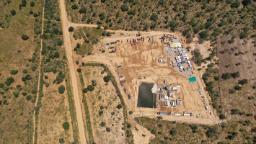Analysis: Searching for more oil as the world heats up


CNN’s David McKenzie and Ingrid Formanek pointed out the painful irony: Namibia, which does not currently have a meaningful oil and gas industry like some neighboring countries, is feeling the harsh effects of climate change. It’s warming faster than other parts of the planet, which is jeopardizing its farming industry.
A fairer share. Namibia, Botswana and Congo rightly want to reap the same benefits from their land that Western countries used to become wealthy.
“Someone who is sitting in Norway and has a very good quality of life because of the oil that was found in the North Sea is now telling the world that it should run on renewables,” Niall Kramer, a South African oil industry consultant and former oil executive, said in CNN’s report last year. “If you are sitting in Africa, your incentives are very different.”
The Times identifies a similar sentiment in Congo: The auction highlights a double standard that many political leaders across the African continent have called out: How can Western countries, which built their prosperity on fossil fuels that emit poisonous, planet-warming fumes, demand that Africa forgo their reserves of coal, oil and gas in order to protect everyone else?
Congo’s top climate official, Tosi Mpanu Mpanu, told the Times the country is focused on bringing Congolese out of poverty.
“Our priority is not to save the planet,” he said. He wants Congo to be compensated, either by more developed countries for protecting its rainforests and peatland, or by oil companies.
Still hooked. That the world’s oil addiction is far from over is frustratingly clear.
As for Biden, his political future is still very much tied to people’s perception of the economy, which in turn is tied partially to gas prices.
Lower gas prices hailed as good news. That gas prices, while still high, have been dropping is a fact the White House has clung to as it’s argued the economy is better than people think.
“In fact, the typical driver is now going to spend about $35 less per month because of the recent decline in gas prices,” Heather Boushey, a member of the White House Council of Economic Advisers, told CNN’s Victor Blackwell on Monday.
The bad news about Biden’s climate agenda. It’s stuck in Congress, where West Virginia Democratic Sen. Joe Manchin argues Americans can’t afford more spending — at least not right now — to transition the country away from an oil-based economy. Manchin disregards the cost of doing nothing.
As White House officials and Treasury Secretary Janet Yellen will tell you, that perception is wrong. It’s an eight-member committee at the National Bureau of Economic Research, which is not a government agency, that officially declares recessions.
Current US officials and their counterparts around the world do agree the climate crisis is occurring. They also seem to be unified in recognizing the political reality that voters like cheaper energy.








